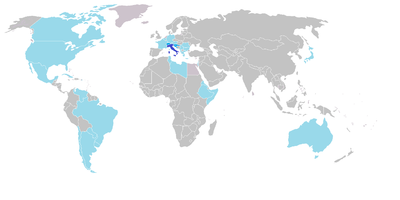Many people around the world are open to learn Italian online. What kind of students are ready to embrace new learning methods? Are Italian teachers prepared for supporting the demand and be up and running with technological evolution?

The seeds of the Italian language
First off, how many people in the world speak Italian? Let’s first consider native speakers. Italian is spoken by about 61 million people in Italy, including foreigners, and 4 million Italians living overseas. There are 1.5 million native speakers in the US and Canada, 500.000 in Switzerland, 300.000 in Australia.
Then we have about 80 million people with Italian blood born and living abroad, speaking some Italian at home, including regional dialects. For example, 50% of the population in Argentina is of Italian origin, 44% in Uruguay, 38% in Brasil, the country with the largest population of Italians outside Italy. In the US there are 18 million people of Italian origin, about 6% the population.
13.500.000 people in the EU speak Italian as second language. Worldwide, Italian is the fifth most studied foreign language, after English, French, German, and Spanish.
Why people study Italian and who is ready to learn Italian online
Labelling people is not nice, but for the sake of simplicity, based on our experience of teachers of Italian to foreigners, we can say there are three main categories of Italian learners. Of course, in most cases students have mixed characteristics.
- People of Italian origin– They want to visit the land of their grand-grandparents and get closer to Italy. They usually start learning Italian before travelling to Italy and keep studying after that. Some go to see the city or village their family came from and fall in love with the country, so they want to improve their language skills for coming back again to Italy. If they have a local Italian school back in the country where they live, they start taking classes and don’t give up easily. If they don’t have any school in the neighbourhood they may start to learn Italian online. They generally know some basic Italian words and understand the language, but standard Italian is very often a totally new language to them, because they spoke local dialects at home.
- Travellers – After the first trip to Italy, many people want to come back. The reason is quite simple. Italy is beautiful and Italians are friendly. Speaking Italian helps to enjoy holidays, get along together with Italians and make some friends, find your way around the country, outside the traditional itineraries. Along with the consolidated flow of tourists from North America, Northern Europe and Japan, new wealthy people from emerging countries want to come to Italy and learn the language. Russians, Arabs and Chinese are the new lovers of Italy and are quite positive about studying Italian online. Women and shopaholics fit better the profile of those new comers.
- “Italophiles” – The sad years of Sacco and Vanzetti and Italophobia are long gone, thank god. A few negative stereotypes still exist, (and some very funny ones are true) but now Italy and Italians are generally admired. The image of Italy abroad is definitely positive. The country and the iconic Italian lifestyle is respected almost everywhere. So, learning Italian is now a sort of identification with Italy and the good things about our country. In this “category” of students the extremes are the real lover, driven by authentic passion for Italy and the Italian language, and the follower, a “temporary” lover, ready to change according to the flavour of the moment. Both are ready to learn Italian online, but one gives up soon and the other goes on and improves by studying hard. Which one is the latter?
Learn Italian Online – The case of Japan
The openness of Japan to western cultures, and in particular European countries, was very strong before WWII. Then it was replaced by the American dream. Nonetheless, the passion of Japanese for Italian opera, food, sport, fashion and culture in general is very strong. There are more Pizzeria’s in Tokyo than Napoli, elegant shopping districts in Japanese cities are packed with premium expensive Italian retail stores. Japanese tourists are everywhere in Italian cities.
Many Japanese learn Italian online. Simply as a hobby, or for enjoying their (short) Italian holidays. The online language business is consolidated and profitable in Japan. The Japanese, partly for the lack of free time and the scarcity of qualified schools, are used to learn Italian online with native teachers. Of course, technological innovation and hi-speed internet connections, make Japan an ideal market for e-learning.
There are large companies delivering this service in Japan. The big ones, like Nova, GEOS, ECC, and Aeon, have hundreds of thousands of students taking advantage of their e-learning language lessons. Japanese are very aware consumers, they pay attention to quality and trust Japanese companies better than foreign ones. That’s true also for Italian schools. If a school or a teacher is not located in Japan, and is not up to Japanese customer service standards, preferably provided in Japanese, it is extremely difficult to penetrate the market. There are at least 350.000 students who usually learn Italian online, at school, or following lessons on the Japanese national TV NHK.
We started our online Italian language experience in Japan in 2003 and learned a lot about cutting edge e-learning techniques. Now, Dante Learning has just opened a branch in Tokyo and is up and running.
Skype Italian lessons: welcome to the jungle
If you google “learn Italian online”, the Skype logo pops up immediately. Of course, Skype opened a new world of great opportunities for teachers and students of foreign languages. Does it mean that every Italian speaker can become an Italian teacher?
Free language exchange is a fantastic opportunity for making new friends online on the other side of the world, share your ID and start to speak a foreign language with a perfect stranger. That’s a great thing, a lot of Italians want to learn English and go for a language exchange. GO for it and speak to people. However, do you think a Skype friend is a teacher?
How many online Italian language schools are there, available on the market? Plenty, and some are really promising. We won’t name them of course, they are competitors, but there are some great examples of experienced valid teachers doing business online. Some use Skype, some others don’t. For example, we use Skype, along with audio and video material, online exercises and other tools. Some golden rules if you really want to learn the language and go beyond a free conversation on Skype:
- Avoid non native Italian speakers. Would you learn French from an Italian teacher, Japanese from a Chinese or German from a Spanish speaker? There are many foreigners taking advantage of a few years spent in Italy opening a good looking blog and selling Italian classes on Skype. Just dont…
- Choose after a trial lesson. Ask for a free lesson before giving money to a perfect stranger. You may be disappointed of the result after the trial, but at least you can buy yourself a pizza with the nickels and dimes you didn’t throw away.
- Choose only a legitimate business. Avoid people without a website and clear terms and conditions. Ask for a phone number, and invoice after your payment. Check their website before taking any classes. Protect yourself from improvised teachers.
Competition out there is fierce. Italy and Italian teachers need to catch up quickly. Our country lacks a decent hi speed internet network and Italian schools are not used to e-learning and are not ready for opening 2.0 language classes. If you are a professional Italian teacher, take a private course for e-learning, study abroad for some time and see what’s available on the market. There are students ready to learn Italian online. Teach them!






